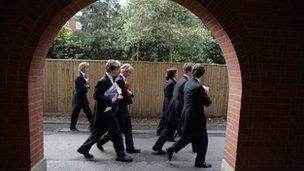Charity tax relief cuts 'will affect very few'
- Published

The government wants to end the practice of people minimising their tax bill by giving to charity
A proposed tax relief cap on charitable donations may not hit charities as hard as first claimed.
Campaigners say cuts on tax relief for donations over £50,000 would cost charities £500m a year - but a BBC report reveals this figure is only "guesswork".
Half of the UK's top 20 charities say donations over £50,000 account for about 1% of total fund-raising income.
The government says the cap will help tackle tax avoidance.
The proposal is to limit the amount of tax relief that can be claimed on charitable givings to £50,000 or 25% of annual income - whichever is higher.
"The reality is that very few of them [charities] will notice the difference," says the former chief executive of Barnardo's, Martin Narey, speaking to BBC Radio 4's <link> <caption>The Report</caption> <url href="http://www.bbc.co.uk/thereport" platform="highweb"/> </link> .
The Charities Aid Foundation (CAF), which advises on effective donations, has conceded the estimated loss to charities of £500m is "guesswork".
"Even if [these figures] are inaccurate, there's a high level of uncertainty - at least you're getting some ballpark of the problem," CAF chief executive John Low told the BBC.
The CAF has commissioned research from Oxford Economics to try to assess the cost of the cap to society, which it is claimed <link> <caption>could be up to £1.5bn</caption> <url href="http://www.thirdsector.co.uk/go/fundraising/article/1130937/tax-relief-cap-will-cost-almost-11000-charity-jobs-says-consultancy/?utm_source=twitterfeed&utm_medium=twitter&utm_term=fundraising&utm_content=fundraising" platform="highweb"/> </link> .
Big donation breakdown
BBC Radio 4's The Report conducted a survey of the UK's top 20 fund-raising charities, as defined by the Cass Business School charity market monitor, which together receive donations exceeding £2bn a year - one fifth of all UK charitable donations.
Over half of the charities replied, including Macmillian Cancer Support which said donations of over £50,000 account for just over 1% of its total fund-raising income - for Cancer Research UK, Save the Children, The National Trust and RNLI such donations account for less than 1% of fund-raising income.
Christian Aid, which raised £62m in 2010-11, said donations over £50,000 accounted for less than 0.5% of its fund-raising income - the same figure given by The Dogs Trust.
The RSPCA said of the £40m in donations it collected in 2010-11, only two had been for more than £50,000. The RSPB said it had received "a handful" of large donations, which accounted for a "very small" proportion of its fund-raising.
The RNIB, the British Heart Foundation and the People's Dispensary for Sick Animals also said the number of such donations was "small".
Guide Dogs for the Blind said it had not received any donations over £50,000.
Marie Curie Cancer said it had received 20 donations over £50,000, but could not say what percentage of its total fund-raising this was.
Oxfam, NSPCC, the Salvation Army and the Royal British Legion did not provide information.
Martin Narey ran the children's charity Barnardo's for six years and says in that time he received only one donation of £50,000.
He supports a cap, saying "I welcome tax relief but I think that the fact that it should be unlimited is untenable when public services are under threat."
However, critics of the cap, such as Peter Kyle, deputy chief executive the Association of Chief Executives of Voluntary Organisations (ACEVO), say capital projects, especially in health, would be adversely affected.
"Cancer Research, for example, is trying to establish a £120m facility at the moment.
"Now, 80% of that is going to come from a dozen or so big donors... that gives you a sense of the importance of these donors."
Private schools
Around 1,000 private schools also benefit from the tax relief and new facilities are often dependent on large donations, which can attract significant tax relief.

Independent schools including Eton and Harrow received £350m in donations last year
Brighton College's bursar Paul Westbrook says it has constructed a new IT block and social space for students with the help of 20 large donations totalling £2m.
Mr Westbrook points out the school also provides scholarships and free places to children from poor families.
Eton and Harrow have been given at least £9m in large donations in the last few years.
Martin Narey says there is a case for varying the tax relief given to charities: "At one extreme there's the marvellous Save The Children and at the other extreme Eton College.
"I think most of us could comfortably make a distinction and say that the former might attract more in tax relief than the latter."
No-one is sure what impact the cap will have on charities although a compromise is expected after Prime Minister David Cameron said earlier this week that the matter "will be dealt with".
However, some philanthropists believe a cap will make donors think twice.
One of the UK's biggest philanthropists, Sir Tom Hunter, who has given more than £50m to charity through his own foundation, told The Report:
"I think it will make people like myself think, well, we're not going to do as much. I haven't met one philanthropist who said 'yeah, it doesn't matter.'"
Treasury Minister David Gauke, who will be meeting Sir Tom to discuss the plans, says the government is exploring how the cap might be implemented and told the BBC "there are various ideas that are being put to us and we are listening".
<bold>Listen to </bold> <link> <caption>The Report </caption> <url href="http://www.bbc.co.uk/programmes/b01h77lv" platform="highweb"/> </link> <bold>on </bold> <link> <caption>BBC Radio 4</caption> <url href="http://www.bbc.co.uk/radio4/" platform="highweb"/> </link> <bold> via the </bold> <link> <caption>Radio 4 website</caption> <url href="http://www.bbc.co.uk/programmes/b01h77lv" platform="highweb"/> </link> <bold> or download </bold> <link> <caption>podcast</caption> <url href="http://www.bbc.co.uk/podcasts/series/r4report" platform="highweb"/> </link> <bold>.</bold>
- Published15 April 2012
- Published15 April 2012
- Published16 April 2012